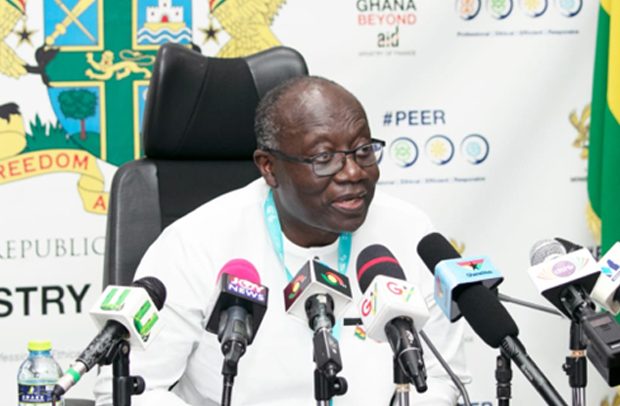Ken Ofori-Atta
Minister of Finance, Ken Ofori-Atta has announced tax relief packages by the government to boost the economy, despite plans to significantly improve the country’s tax ratios to ensure long-term competitiveness.
According to him, the government believes in lower taxes for industry, and it is working at this aggressively with the Ghana Revenue Authority (GRA) and to be cemented with the standing committee of the Mutual Prosperity Dialogue.
Presenting the 2024 Budget Statement and Economic Policy of the Government, Mr. Ofori-Atta said even though the government has targeted 18-20 percent tax-to-GDP ratio, several reliefs had been prioritised for implementation.
He indicated that the government would extend zero rate of VAT on locally manufactured African prints for two (2) more years, and also waive import duties on import of electric vehicles for public transportation for a period of eight years.
The government will also waive import duties on semi-knocked down and completely knocked down electric vehicles imported by registered EV assembly companies in Ghana for a period of eight years as well as extend zero rate of VAT on locally assembled vehicles for two more years.
According to the Finance Minister, there will be zero rate VAT on locally produced sanitary pads in 2024, and that the government will again grant import duty waivers for raw materials for the local manufacture of sanitary pads.
“Government will grant exemptions on the importation of agricultural machinery equipment and inputs and medical consumables, raw materials for the pharmaceutical industry,” Mr. Ofori-Atta stated.
He said a VAT flat rate of 5 percent to replace the 15 percent standard VAT rate on all commercial properties will be introduced to simplify administration.
To address the negative externalities of plastic waste and pollution, the government will review and expand the Environmental Excise Duty to cover plastic packaging, and industrial and vehicle emissions, the Minister added.
He noted that the Stamp Duty Act, 2005 (Act 689) has not been reviewed since its enactment in 2005, and to realign the rate with current economic realities, the Government, in 2024, will review the rates and fees for stamp duties.
“The bands subject to ad valorem taxes will be expanded while the specific rates will be reviewed upwards,” Mr. Ofori-Atta said.
According to him, a simplified tax return will be introduced as a means of promoting voluntary compliance as part of the modified taxation scheme for individuals in the informal sector.
“This approach will make it easier for taxpayers to fulfill their tax obligations to the state,” he said and continued that “the Tripartite Committee has concluded negotiations on the National Daily Minimum Wage.”
“The tax-free portion of the individual income tax rates will accordingly be adjusted to take care of the change,” the Minister said.
“Mr. Speaker, our approach to tax policy since 2017 was to give significant relief to the private sector until expenditure pressures from 2020 required a more aggressive approach.
“In that regard, it is difficult to implement all the structural reforms and tax reliefs needed to immediately lower and/or eliminate certain tax handles,” he explained.
He indicated that the Government recognises the constraints the country’s medical personnel face in providing health care for citizens.
“With the passage of the Exemptions Act, the Government will engage the Ghana Medical Association on waivers for importation of vehicles to ease the transportation burden of our doctors.
“This policy will enable them to deliver quality and timely healthcare,” he asserted.
Protection Of Lives
The Finance Minister said as a government, they have always been committed to protecting the quality of life of Ghanaians.
“Total wages and salaries for workers has increased from GH¢14.7 billion in 2016 to GH¢37.5 billion. All workers were paid full wages and salaries and on time, even when revenues plummeted during the COVID-19 Pandemic.
“In the difficult economic challenges, we paid 15 percent 19 Cost of Living Allowance (COLA) for 6 months in 2022 to cushion 949,122 workers, some 50 percent more than 2016,” he noted.
By Ernest Kofi Adu, Parliament House

